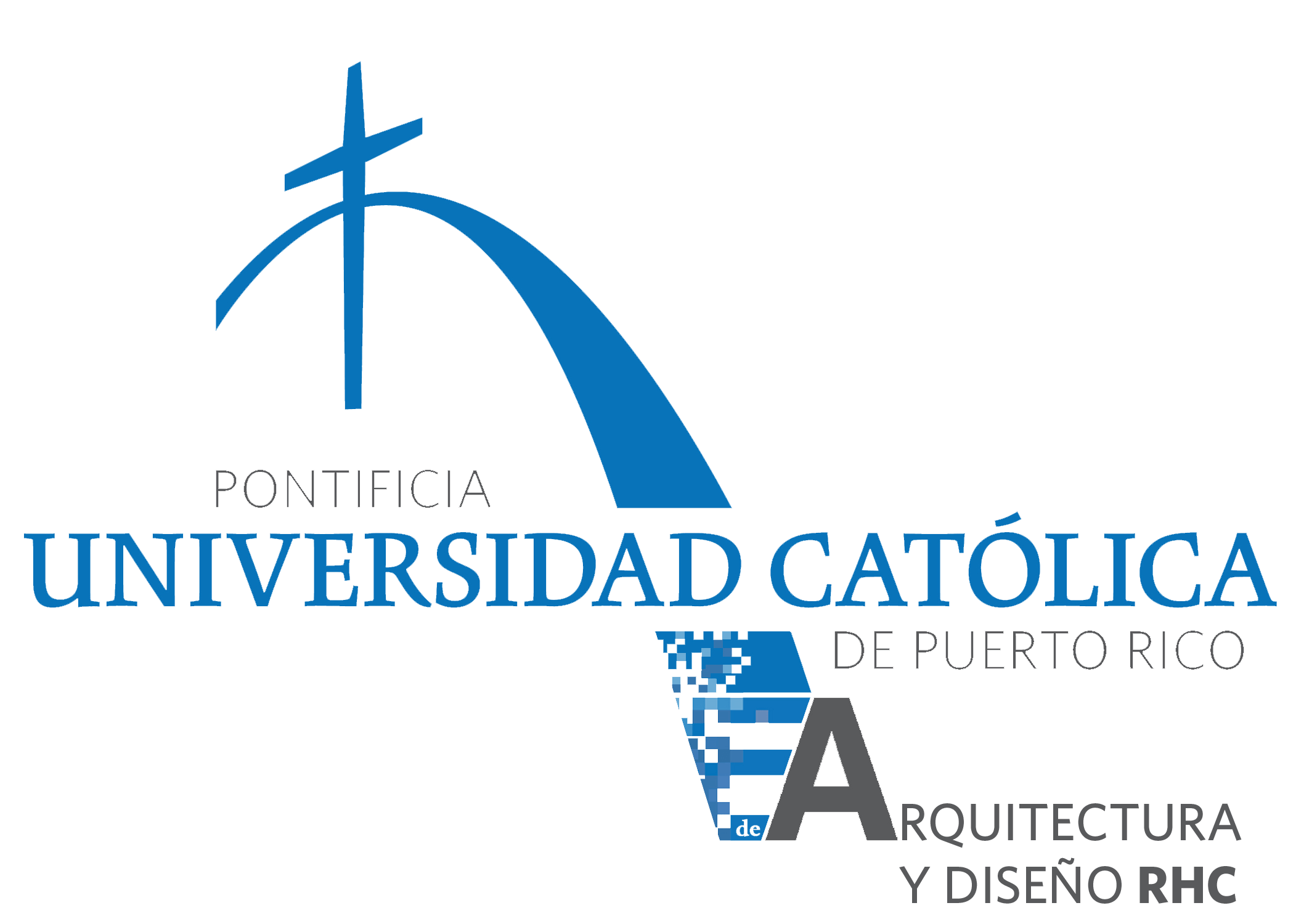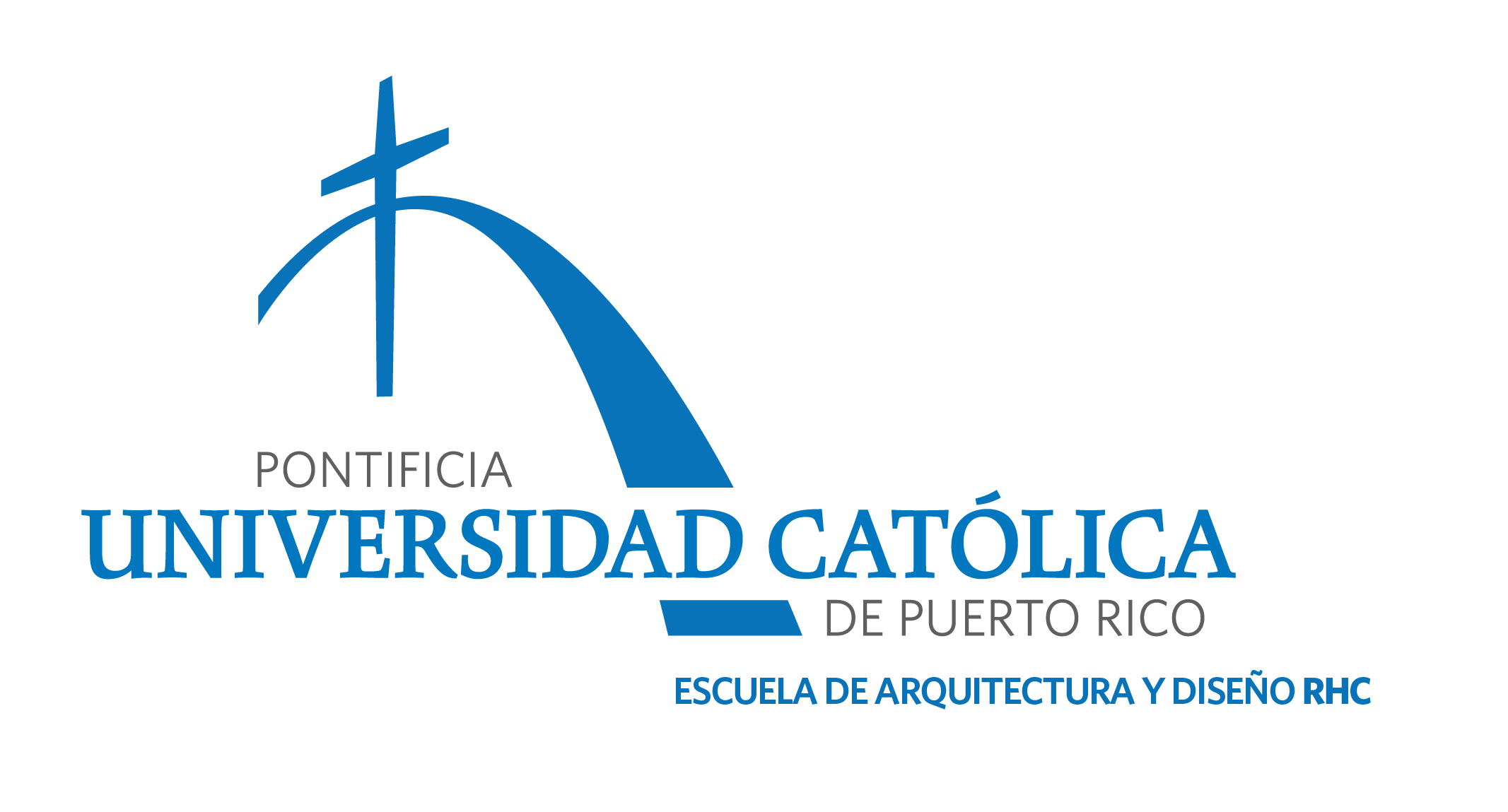
La genética de un nuevo Arquitecto Estratégico
La Escuela de Arquitectura y Diseño RHC de la Pontificia Universidad Católica de Puerto Rico aspira a forjar un nuevo Arquitecto Estratégico dentro de una ecología innovadora de experimentación y conocimiento expansivo. A través de una estructura curricular interdisciplinaria, una plataforma digital única complementaria a esa estructura y un compromiso de impactar a la sociedad de manera constructiva mediante una interacción institucional multisectorial, la Escuela de Arquitectura expone a su comunidad, estudiantes, profesores y visitantes a procesos creativos que trascienden la actitud convencionalista y el estado obsoleto de las propuestas del establishment.
La arquitectura, dentro del ámbito del ejercicio profesional, se considera un catalizador de iniciativas de vanguardia en el uso y desarrollo de los entornos sociales, asumiendo así la responsabilidad por las implicaciones de las intervenciones propuestas dentro de nuestras comunidades. La Escuela de Arquitectura visualiza futuros profesionales capaces de involucrarse en estos escenarios con liderazgo y responsabilidad social, guiados por una ética que conduce de manera constructiva a una genética intelectual definida por diez ejes primarios.
- Respeto – La valoración de la biodiversidad definida como territorio y cultura. Respeto al Patrimonio Público (propiedad y ambiente), Urbano, Arquitectónico y Paisajístico. Cada miembro de nuestra comunidad actúa en respeto a la persona, propiedad y recursos de nuestra Escuela y Ambiente.
- Dignidad hacia el Trabajo – La valoración de la persona, el trabajo y los recursos profesionales, académicos y de investigación para la acumulación de conocimientos para mejorar la calidad de nuestros espacios y ambientes. Dignidad hacia el Trabajo que todos los miembros de nuestra comunidad debemos hacer para la adquisición de disciplina personal y ejecución colectiva de excelencia en la formación de un cuerpo de nuevos conocimientos que aporten a nuestra ciudad y región como un ecosistema saludable para el intercambio humano y ciudadano comprometido y responsable con la sociedad puertorriqueña.
- Prudencia – La valoración de un análisis mesurado de las acciones, inversiones, intervenciones, manejo del tiempo y recursos es esencial para que la energía invertida por cada miembro de nuestra comunidad sea de su máximo rendimiento. Guiados por una visión de sostenibilidad y responsables por el manejo justo de los recursos económicos y físicos, cada miembro de nuestra comunidad es sabio en su accionar sin limitar las capacidades y responsabilidades de otros individuos, de la comunidad y de ellos mismos.
- Solidaridad – La valoración y consideración de las necesidades y aspiraciones de cada individuo de nuestra comunidad para mejorar a través de la educación su calidad de vida. Solidaridad que se materializa en nuevas formas cooperativas de enseñanza, aprendizaje, investigación y desarrollo del conocimiento.
- Liderazgo y Compromiso Social – La valoración del Liderazgo y Compromiso Social con la construcción y aportación Cultural de la Arquitectura, el fortalecimiento del espíritu y el cultivo de la imaginación para promover la innovación y viabilizar afortunadamente influir en nuestra cultura arquitectónica y urbana a nivel global
- Ecuanimidad – La valoración de la ecuanimidad en el ejercicio del juicio crítico en la evaluación del desempeño del becario para promover la discusión pausada y profunda de ideas en la búsqueda de nuevos conocimientos sobre el urbanismo, la arquitectura y el paisajismo.
- Tolerancia hacia las Diferencias y Gobierno Participativo – La valoración y respeto hacia el becario, la cultura y los procesos de intercambio que enriquecen el capital social e intelectual de nuestra comunidad. El valor hacia la localidad no debe estar reñido con la capacidad de apertura e intercambio de experiencias, tendencias y esfuerzos de otros académicos y profesionales en Puerto Rico y el Mundo. La valoración de la participación en el ejercicio democrático del crecimiento de una Escuela a través del fortalecimiento del liderazgo estudiantil, el desarrollo del cuerpo docente y la capacitación administrativa.
- Promoción y Difusión – La valoración de difundir, promover y divulgar los hallazgos y aportes investigativos de nuestra Escuela. Desde el trabajo individual, colectivo y multisectorial a través de los medios de comunicación tradicionales y no tradicionales para educar sobre la ciudad y los atributos sociales y culturales de la arquitectura y el urbanismo.
- Estimular el Proceso Creativo y el Cultivo de la Imaginación – La valoración de la educación y el proceso creativo como abierto, interdisciplinario y multisectorial, respetando la propiedad intelectual y creativa de los compañeros en la búsqueda del conocimiento, el cultivo de la imaginación y la aplicación de las ideas en beneficio de la ciudad.
- Cooperación y Colaboración – La valoración del aporte disciplinar como un ejercicio social de cooperación y colaboración en el que los objetivos se alcanzan a través de la sincronización de las fortalezas y el mejoramiento de las capacidades individuales en la ejecución de proyectos e investigaciones.
The genetics of a new Strategic Architect
The School of Architecture at the Pontifical Catholic University of Puerto Rico aims to forge a new Strategic Architect within an innovative ecology of experimentation and expansive knowledge. Through an interdisciplinary curricular structure, a unique digital platform complimentary to that structure, and a compromise to impact society constructively through a multisectorial institutional interaction, the School of Architecture exposes its community, students, professors and visitors to creative processes that transcend the conventionalist attitude and the obsolete state of the proposals of the establishment.
Architecture, within the realm of professional practice, is regarded as a catalyst of vanguard initiatives within the use and development of social environments, thus assuming responsibility for the implications of proposed interventions within our communities. The School of Architecture envisions future professionals that are able to engage these scenarios with leadership and social responsibility, guided by an ethic that leads constructively to an intellectual genetic defined by ten primary strands.
- Respect – The valuation of biodiversity defined as territory and culture. Respect towards the Public (property and environment), Urban, Architectural and Landscape Patrimony. Each member of our community operates in respect towards the person, property and resources of our School and Environment.
- Dignity towards Work – The valuation of the person, the work and the professional, academic and research resources for the accumulation of knowledge to better the quality of our spaces and environments. Dignity towards the Work that all members of our community for the acquisition of personal discipline and collective execution of excellence in the formation of a body of new knowledge that contributes to our city and region as a healthy ecosystem for the human and citizen exchange engaged and responsible with Puerto Rico’s society.
- Prudence – The valuation of a measured analysis of the actions, investments, interventions, time and resource management is essential in order for the energy invested by each member of our community to be of its most output. Guided by a vision of sustainability and responsible for the fair management of economic and physical resources, each member of our community is wise in their action s not limiting the capacities and responsibilities of other individuals, of the community and themselves.
- Solidarity – The valuation and consideration of the needs and aspirations of each individual of our community to improve through education its quality of life. Solidarity that is materialized in new cooperative ways of teaching, learning, research and development of knowledge.
- Leadership and Social Commitment – The valuation of Leadership and Social Commitment with the Cultural construction and contribution of Architecture, the strengthening of the spirit and the cultivation of imagination to promote innovation and luckily making feasible influencing our architectural and urban culture on a global level.
- Equanimity – The valuation of equanimity in exercising critical judgment in the evaluation of the fellow’s performance to promote the paused and profound discussion of ideas in the search of new knowledge on urbanism, architecture and landscape architecture.
- Tolerance towards Differences and Participatory Governing – The valuation and respect towards the fellow, culture and the exchange processes that enrich the social and intellectual capital of our community. The value towards locality should not be quarreled with the capacity of aperture and exchange of experiences, tendencies and efforts from other academics and professionals in Puerto Rico and the World. The valuation of the participation in the democratic exercise of growing a School through the strengthening of student leadership, faculty development and administrative capacitating.
- Promotion and Dissemination – The valuation of disseminating, promoting and spreading the findings and research contributions of our School. From the individual work, the collective and multisectorial work through the traditional and non-traditional communication mediums to educate about the city and the social and cultural attributes of architecture and urbanism.
- Stimulate the Creative Process and the Cultivation of Imagination – The valuation of the education and creative process as open, interdisciplinary and multisectorial, respecting the intellectual and creative property of fellows in the search for knowledge, the cultivation of imagination and the application of ideas to the benefit of the city.
- Cooperation and Collaboration – The valuation of the disciplinary contribution as a social exercise of cooperation and collaboration in which the objectives are reached through the synchronizing of the strengths and improvement of the individual capacities in the execution of projects and Research.

